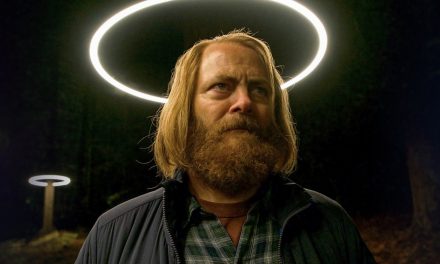“If something is to stay in the memory, it must be burned in: only that which never ceases to hurt stays in the memory.”
Nietzsche, On the Genealogy of Morals
Watching the recent Severance season 2 finale “Cold Harbour,” I became increasingly intrigued with the show’s explorations of selfhood and autonomy, whereby the ‘innies’ are disposable tools – they are seen no longer as souls but are a distillation of Byung-Chul Han’s notion in Psychopolitics that “persons are being positivized into things, which can be quantified, measured and steered” (2017, 12). The show vitally expands Han’s description of class struggle as “an inner struggle against oneself” (2017, 5) into the physical realm, utilising science-fiction’s familiar dystopian technology to exercise this commentary. In physically splitting the self, life in Severance becomes a series of desperate dissociations, continuous attempts to cut out pain that creates new lives born from grief – Mark S., for instance, who spends much of his existence unwittingly hungover owing to his outie’s drinking habits (yet another attempt at disconnection). Mark Scout’s life lived at Mark S.’s expense. Not only is Mark S.’s life not under his control (instead under Lumon’s), but his body is also not his own. Ultimately both innie and outie are at the mercy of each other – Mark S. reaps the consequences of his outie’s addiction, Irving B. battles sleep deprivation, and Helly R.’s attempted suicide demonstrates that the innie’s power over outie is physical harm – pain and hurt transcend the severance procedure. In Severance, “[p]eople are now master and slave in one” (Han 2017, 5) – the self becomes both the oppressor and the oppressed, one soul and another lost half, one body, controlling and subservient, harming and harmful. Perhaps not one body, but two, as innie and outie take on differing ownership of their shared flesh – Helly versus Helena’s body language is an interesting example. We see an arguably greater difference between Helena and Helly than other innie/outie pairings, particularly in how Britt Lower’s physicality alters to mirror each life. Helena is restrained and not in control of her own body in the way she has suffered under her father’s constant criticisms (such as where it is shown he wishes she would eat her eggs raw, even as she is starving herself with just one boiled egg), whereas Helly lives with rebellious determination. While new to this body, she has been stripped of the life of subservience and abuse that has shaped Helena – to be severed is to start anew, to be rid of pain. Speaking to Helly, Jame says that “I do not love my daughter. I used to see Kier in her, but he left her as she grew,” going on to describe that he now sees Kier in Helly. Helly/Helena is then representative of Severance’s themes of dual ownership of the flesh and soul as, in Jame’s eyes, Helly is all that Helena is not. It is a distinct abjection, a “vague sense of horror that permeates the boundary between the self and the other” (Phillips 2014, 19), for how do we determine who exactly is the self and who is the other? Whose life is more valuable?
Such questions are directly explored in 2×10 “Cold Harbour” as Mark, Devon, and Harmony attempt to convince Mark’s innie to save Gemma. His innie protests, considering “You want me to give my life? […] The lives of everyone down there? […] Just to save one person you happen to care about?” Here is the abject horror: to Mark S., Gemma is not a deep, burrowing, aching, love and thus in splitting himself from pain Mark has split his being in two. What are we without the love and loss that shapes us? Mark without Gemma, Helena without her father – as noted by Petey’s ex-wife in 1×04 “The You You Are”; to know someone while severed means “You didn’t even know him at all.” This is not to reduce innies to empty facsimiles of their outies of course, but instead indicate the degree to which these are separate lives, each whole and half at once. In their book Precarious Life, Judith Butler writes that “[l]oss has made a tenuous ‘we’ of us all” (2004, 20) – Severance explores then that to cut oneself from pain is to create something new that isn’t quite you. To ignore the love and loss that has shaped you is to live in a new selfhood, it is to be “master and slave in one” to your emotion, where “[t]he body is calibrated to be a production-unit” rather than a human vessel. It is also a fruitless endeavour, as we see that despite the severance procedure attempting to exact such a separation, the innies experience love and its consequential grief and pain – Helly and Mark’s love, Irving’s death and funeral, Dylan’s grief over his wife and children. In this way, Tolstoy’s The Death of Ivan Ilyich (a text referenced directly in 2×07 “Chikhai Bardo”) becomes central to an exploration of Severance – the novella explores the notion that to accept, to welcome, pain is an essential facet of life. One cannot live and experience what makes life (relationships with others) without pain. As Butler describes, “[l]oss and vulnerability seem to follow from our being socially constituted bodies, attached to others, at risk of losing those attachments, exposed to others, at risk of violence by virtue of that exposure” (2004, 20), a notion abundantly clear in Lumon’s failure to cut out pain, as to do so one would need to sever oneself from love; really one would need to sever oneself from everything.
Severance then becomes a show vitally about what constitutes a life, what it means to experience living. Attempts to disconnect from hurt are futile, as pain is as integral to our experience of life as breathing, to detach oneself from this is to lose ownership and agency of yourself – no longer living for you, life becomes empty and menial, carrying out arbitrary work that while “mysterious and important” holds no real meaning. For real meaning is in the flesh and the soul and connections to what is around us, real meaning is in love and loss and everything in between.
Noah Gray is an undergraduate student in the School of Media and Communication at the University of Leeds. His research interests include the relationships between the body, power, and desire in film and TV, as well as queer and specifically trans readings. He is currently working on an exploration of power in Succession (2018-2023) through the Roy siblings’ relations to their bodies.
REFERENCES
Butler, J. 2004. Precarious Life: The Powers of Mourning and Violence. London: Verso.
Chul-Han, B. 2014. Psychopolitics: Neoliberalism and New Technologies of Power. London: Verso.
Nietzsche, F.W. and Kaufmann, W. 1989. On the genealogy of morals; Ecce Homo. New York: Vintage.
Phillips, R. 2014. Abjection. Transgender Studies Quarterly 1 (1-2): 19-21.
Tolstoy, L. 2008. The Death of Ivan Ilyich and other stories. London: Penguin Books.




